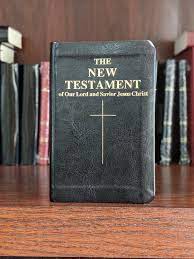
Gifts are great aren’t they? Especially when someone really takes the time to getting you something that you really wanted or needed. It takes a special person to take that type of care in choosing something for you and it tells you just how much you mean to them. Now here is a little secret…I am not one of those people. I develop a serious case of stress colitis when I think about having to get a gift for someone. I think it stems from when I would get Christmas gifts for my Mom. She invariably would return whatever I got her. So, now it is like risking rejection when I give someone a gift. Or maybe I am just lazy.
So you may be wondering what all this self-psychoanalysis has to do with today’s readings. It is really about gifts. Most of the gifts we get, even if from some well intentioned person who truly loves you, are here today and gone tomorrow. Clothes go out of style, mechanical items wear out and break or we just forget most of the gifts we have been given over the years. I do remember the cool set of American, German, French and British GI Joes I got when I was 8 or 10 or so. But I digress. So, other than a neat set of plastic warrior dolls, gifts rarely last.
But how about the one that John speaks about today from his 1st epistle:
And this is the testimony:
God gave us eternal life,
and this life is in his Son.
Whoever possesses the Son has life;
whoever does not possess the Son of God does not have life.
Now there is a gift that lasts! I mean it has the word ETERNAL right in it!! Who would not love a gift like that? John even gets a bit more direct in the last verse:
I write these things to you so that you may know
that you have eternal life,
you who believe in the name of the Son of God.
So all we have to do to live forever is to believe that Jesus was the Son of God! There should not be a single person in the world who would not go along with this. I mean we take every new drug, every exercise program or diet in order to add a few extra years onto our lives. Here John is talking about living forever…FOREVER! Won’t find that promise from Pfizer.
So, why doesn’t everyone get on this band wagon? The only reason that makes any sense is that they don’t believe it. That what is written in the Gospels and the rest of the New Testament is, simply stated, not true. That the books that the Catholic Church codified into the Bible in the 4th century are not reliable…made up even. Well, all of us here at ACM believe that the Gospels and letters in the New Testament are true…don’t we. And if we do, why do we believe it and why don’t others also believe? So I decided to look into some reasons why the New Testament should be believed and trusted as being reliable by everyone.
- We have over 5,500 manuscripts of the Greek version of the New Testament. With the oldest recorded complete NT being from the middle of the 4th century. The NT is by far the most reproduced historical document in history. This means that it was so valued and so seen as being accurate that it was reproduced over and over again with an astonishing 95% agreement between the copies. In fact, the NT would be able to be admitted into evidence in a court of law under the Ancient Documents Rule for antiquated materials.
- The books of the NT, especially the Gospels, were written within a few decades of Jesus’ ministry. Meaning that there were certainly eye witnesses alive at the time of their writings who could have refuted what had been written thus discrediting their reliability. In the books of the Acts of the Apostles, the miracles performed by the apostles were acknowledged by the same religious authorities that put Jesus to death. They warned Jesus’ followers to cease speaking of Jesus and the Sanhedrin showed worry: “What are we going to do with these men?” they asked. “Everyone living in Jerusalem knows they have performed a notable sign, and we cannot deny it. (Acts 4:16)
- Multiple Christian and non-Christian writers from the first century AD wrote of Jesus in their writings from this period.
- Historical references in the NT (names of people, paces, events, etc) match the historical record
- The books of the NT were read publicly in the synagogues,, early churches and in the public square. They could have easily been called out as being false through investigation. Being proven false the manuscripts would not have been reproducer to the magnitude that they were.
The evidence is there and it is abundant. A person could choose to ignore the facts but they cannot dispute them. The gift God gave us in His Son is real. This truth was not made up at the time they were written in the first century nor did the Church manufacture the writings later through the ages. You can trust them as being true. Now, what a person does with this knowledge is up to the individual. You can either return the gift to the giver or you can cherish it as the best present you were ever given. There is no in-between.
